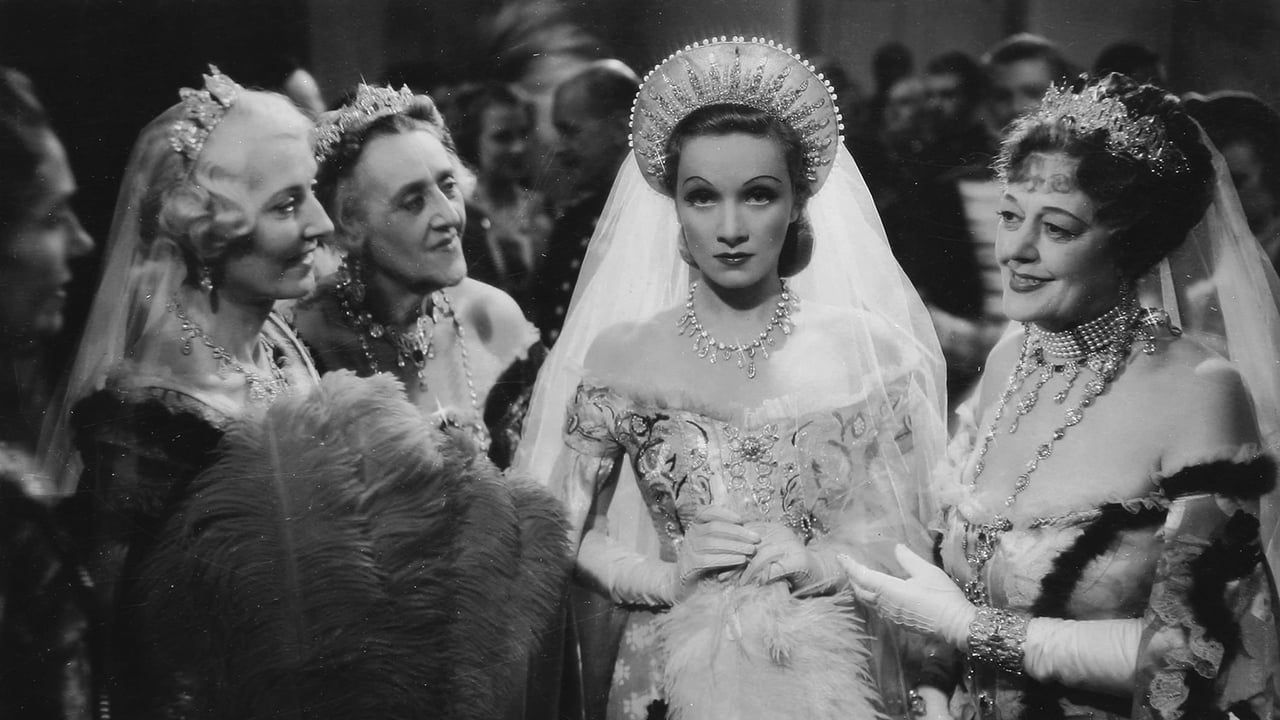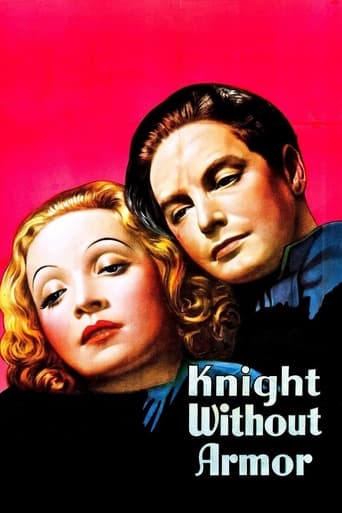

I'm a Donat and Dietrich fan and also a history buff so I wanted to see this film when it aired on Turner Classic Movies (USA). I picked it to watch with my wife thinking it had some emotional impact and not just action. I won't totally pan this effort but for a contemporary audience this is not one of the better romantic chase films around. The problem is that as an American I don't have a high regard for Aristocracy or Communism, so it's hard to bond with these characters. Add on to that, the hero's are caught switching over enemy lines more then once and it starts to be a dizzying mess. I liked the palace scenes when the revolution took over and also seeing the White Russians which I don't think many Americans know about. At the end the train they are leaving on is an American Red Cross train. I liked the film from a history buff standpoint because I read a book about American troops in Russia fighting with the White Russians at places like Archangel, so I was interested in watching that. I'm not sure my wife was all that into it after the first couple of escapes as we started talking about other topics and just had the movie playing in the background. There was at least once where I thought the movie was over only to see it continue, lol. I'll give it a 6 of 10 by contemporary standards. I'm sure it was highly regarded back in the 30's but it's story line is so obscure and lets face it, who really cares about the fate of Russian aristocrat's? Not me. A better Donat escapist date movie (to me) is The Adventures Of Tartu, the lines are clearly drawn between good and evil and the plot is easy to follow, plus it's exciting!
... View MoreThis was one of the most extreme examples of the durability of eye makeup in 30s cinema. Whether waking up from deep sleep, held prisoner without toilette facilities, covered with dead leaves on a forest floor, traveling across the muddy steppe, the leading lady's penciled brows, shadowed lids and false eyelashes neither budge nor smudge. Even the lipstick stays perfect until near the end when a bout of illness suddenly erases it.But seriously, this is a thoughtful and multifaceted look at the Russian Revolution from a James Hilton novel. But too often the plot wanders off periodically into atmospheric details until one forgets it entirely until it picks up again, reminding us that, oh yes, there is a plot.Marlene Dietrich plays a beautiful countess who emerges from her silken sheets one morning to face a silent mob of armed revolutionary peasants marching directly towards her. She is taken prisoner but rescued by Robert Donat, a British agent posing as a Russian revolutionary. Together they flee their Red pursuers through the wreckage and chaos of post-Revolutionary Russia.As in Doctor Zhivago many years later, we enter the Russian civil war from the perspective of the Reds and then the Whites. This film lacks Zhivago's sweep and scope but presents a convincing and compelling, if somewhat sketchy, picture of its time and place with masterful camera work, authentic looking costumes and surroundings (including actual condensed breath when called for), stirring Russian music, a sigh-inducingly romantic portrayal by Dietrich, the last of her wide-eyed, breathy ingénues, and one of imperturbable gallantry and nobility by Donat.
... View MoreThat was Jacques Feyder's only English movie.He had just done his major works " Le Grand Jeu" "Pension mimosas" and "La Kermesse Heroique" and "Knight without armour" in spite of obvious qualities cannot compare with them.This is a tormented love story between a commissar (Donat) and a Russian countess of the old Russian aristocracy (Dietrich)who try to get to the border .The plot sometimes recalls a "Doctor Zhivago" in miniature.Best scenes ,in my opinion,are to be found in the first part: Dietrich,walking across her desirable mansion,all dressed in white ,finding that her staff has left home and joined the revolution;the same,facing a sinister-looking pack of Reds in her park.The mad station master,ceaselessly repeating that a train is coming into the station (madness was also present in Feyder's former works :"Le Grand jeu "was a good example of folie à deux )
... View MoreHardly ever seen on TV or cable, this sweeping spectacle is a rare but welcome opportunity to see Marlene at the height of her powers as a star. Sadly, good prints seem to be rare. We saw it on a slightly scratchy VHS cassette we bought used on the internet but it brought back wonderful memories and its attention to period Russian detail is truly great. After a while the film overcame its physical limitations (in the print). The Russian atmosphere is superior to that in Dr. Zhivago, which seems flat and two dimensional in many ways. The first appearance of Alexandra at the races in England, her departure by train for Russia, her presentation at court in a procession of girls in white presentation gowns and Russian headdresses--all perfectly detailed--to Nicholas and Alexandra, ("Lucky devil", a court lady says of her fiancé, "he is the most stupid officer at court and she is the smartest girl"), the attempted assassination of her father in her wedding procession across a bridge in St. Petersburg, her taking tea alone at the gardens of the neoclassical Adraxin country estate, served by a procession of servants and then waking up and finding the servants have deserted, the Revolution having begun, are all extremely beautifully done. True to 1930's convention, her makeup is never out of place, except in one scene when peasants capture her in her gauzy nightgown and negligee.Robert Donat is a perfect foil to her elegance, dashing and always the epitome of 1930s savoir faire. His scenes as a prisoner in Siberia are also very well done. All in all a great 1930's adventure of the highest style. They will never make another one like this! Jacques Feyder was a great director and his use of Marlene is equal to von Sternberg's. Bravo Countess Adraxin! Another great and sadly overlooked star vehicle for La Dietrich!
... View More